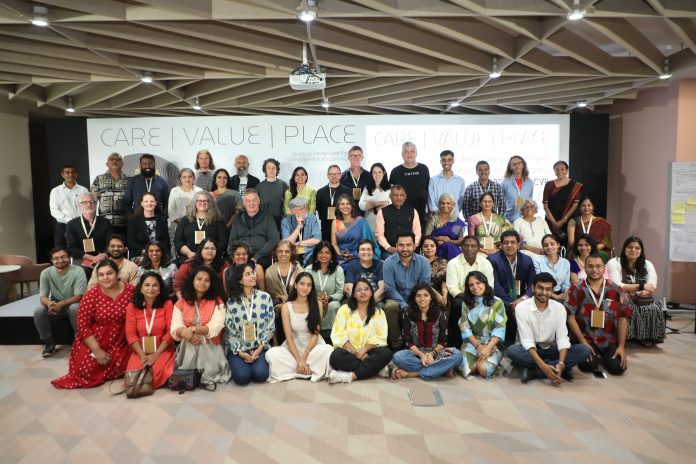BITS Design School in collaboration with RMIT University, Melbourne hosted a unique Design Conference that seeks to apply design methodologies to community-led initiatives addressing ecological and social challenges. The conference, titled “Care, Value, Place” was held in Mumbai on 18-19 September. The two-day conference brought together designers and experts from across other disciplines to create transdisciplinary conversations that saw participants applying their minds to real-world, place-based projects collaborations between design, natural and social sciences, engineering, and technology.
John Thackara, curator of the conference set the context, “Sustainability and climate change only make sense when we adjust our actions to put care and value for people at the center. Care is a state of mind and India is a great example. People in India live radically lighter in terms of material needs compared to those at the center of the great acceleration. We need a society rooted in care, where economic activities take second place. Shifting care to the top of our value system—care for life over care for GDP—is a huge challenge. But if we define development based on care as the foundation for social complexity and success, India may already be the most developed country in the world.”
Dilip Gaur, Member of the Board of Governors, BITS Pilani shared his thoughts, “Birla Institutes were established with the vision of nation-building and shaping the leaders of tomorrow. This conference which brought together visionary leaders from diverse fields has seen meaningful discussions that will contribute to creating a better world. In this pursuit, the success of any initiative will depend on two crucial factors: its scalability and sustainability. It is important that while the initiatives are sustainable for the environment, they are also sustainable projects that continue to create value for society for a longer period”
Nandita Abraham, Dean, BITS Design School spoke on the vision behind the school, “BITSDES was conceived as a global hub where individuals from diverse disciplines could collaborate and innovate in the practice of design. When you say design what usually comes to mind are industrial, product, fashion, visual and other such forms. We saw this conference as an opportunity to do more. What we aimed for was to take design methods and a transdisciplinary approach to projects being done by grassroot development organisations on ecological and societal issues.”
The conference covered themes such as urban ecological restoration, community-managed natural farming, sustainable livelihoods in waste ecosystems, frugal innovation, and mobility solutions in 15-minute cities. One of its main goals was to explore emerging opportunities where design can drive scalable and sustainable solutions to environmental and social challenges.






